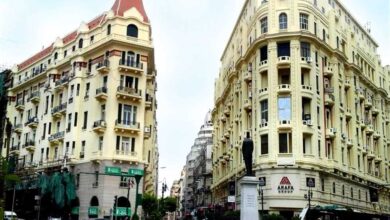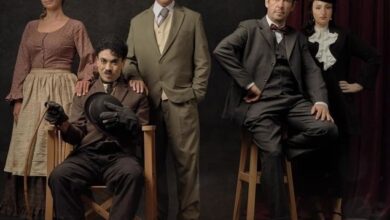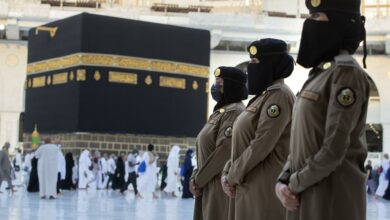Last week at downtown’s Rawabet Theater, the Egyptian writer, theater director and founder of Sabeel for the Arts, Dalia Basiouny, performed her monodrama “Solitaire” for the first time. The play, which takes its name from the card game and becomes a metaphor for revolutionary Tahrir Square, explores the notion of identity, but in a relatively didactic way.
“Solitaire” follows a decade in the life of a character in her thirties named Mona, starting with the September 2001 attacks and ending with Egypt's 25 January Revolution. An Egyptian who moves to New York City with her husband and daughter, Mona is emotionally torn between her new life and her home country. Discrimination against Arab women increased in the US after 9/11, with mass media and cultural production playing a critical role. Mona tells the audience how news channels blamed the attacks on Arab and Islamist militants as they happened. “How was it possible for a TV host to reach such a conclusion when the events were still happening?” she asks.
Mona's desire to return to Egypt is hampered by socio-economic and political conditions as well as her husband’s constant assertion that “It’s not practical.”
Before 9/11, Arabs in the West were “the most invisible of the invisible,” Basiouny, who like her character also lived in America, told Al-Masry Al-Youm. Ever since, she said, they have risen into the forefront of events, but often with very negative stereotypes. Arabs were forced to renegotiate their identity. Basiouny said that Mohamed, a waiter at a bar in her New York neighborhood, became Mo.
The status of women was even worse. In “Solitaire” Mona says she decided to wear the veil as a political, not a religious, decision, in solidarity with thousands of female Arabs and Muslims being repeatedly searched and detained at US airports.
Pressured by her husband to apply for citizenship, Mona finally agrees and eight months later — right before the outbreak of the Egyptian revolution — is informed that her application has been accepted. For some “irrational” reason, she is resistant. Hopes for real change in Egypt were still non-existent. Even when Egyptians first took to the streets on 25 January, Mona is cynical. With the numerous protests against the wars in Afghanistan and Iraq, as well as the Gaza blockade, which Mona either helps orchestrate or participated in, she is pessimistic about the power of protests to instigate real change. “In the land of the free,” as she sarcastically describes the US, there was no response on the part of the state or international community. “What can the protests in Egypt possibly achieve?” As she follows the unfolding of events, however, Mona decides to return to Cairo and participate in Tahrir protests and marches organized by university professors.
To give audience leeway into Mona’s psyche, Basiouny complements the performance with a video projection, something the playwright has experimented with in the past. In “Solitaire,” the video footage acts as Mona’s diary. Shot with a handheld camera, the shaky footage is interesting as an approach, but unfortunately amounts to only a literal interpretation of events. For instance, as Mona speaks of the 9/11 attacks, the film shows them; as she recalls the violent "Battle of the Camels" in Tahrir Square, the screen shows mounted Mubarak supporters attacking protesters. The most interesting clip is accompanied by Sol Seppy’s song “Enter One”; here Basiouny moves away from direct translations of Mona’s thoughts and appeals more to the audience’s imagination.
Mona’s story is the first of the three-part performance, which be shown in full later this year. The other two will also explore the lives of two Cairene women from different age groups. The scripts are being revised by Basiouny in an attempt to update them to reflect current events, as she did with Mona’s part. Since Mona’s story originally focused on political protests anyway, it seemed necessary to talk about the Egyptian revolution which inspired the world.




